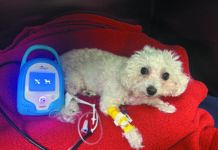[From Tufts April 2010 Issue]
Although hormonal deficits are the largest cause of canine urinary incontinence, several other conditions have symptoms that can include urinary leakage. Among them are:
– Urinary tract infections. Cystitis, bladder stones and other problems in the urinary tract can cause a housetrained dog to begin leaking urine. Other symptoms are blood in the urine, straining to urinate and the passage of very little urine. A urine sample confirms the diagnosis of infection. Treatment consists of a short course of antibiotics. X-rays or ultrasound are needed to diagnose stones. Treatment for stones ranges from dietary changes to surgery, depending on the type, location and size of the stones.
– Cushing’s disease. This condition occurs when a dog’s adrenal glands produce excessive cortisol. Its many symptoms include increased water intake and more frequent urination, which could lead to urinary leakage if water intake is sufficient and elimination opportunities are insufficient; weight gain; increased appetite; hair loss; weakened legs; and thinning, darkened skin. Any breed can acquire the disease, but some are more susceptible than others: Labrador retrievers, dachshunds, golden retrievers, beagles, poodles, boxers, German shepherd dogs and most terriers.
The condition can also result from an overdosage of steroids (cortisol) to treat another condition or a tumor of the adrenal gland. Depending on the cause, treatments include medication to reduce cortisol levels in the blood, removal of the affected adrenal gland or reducing or eliminating the use of steroids.
– Age-related urinary incontinence. A dog over 10 years of age who begins to be incontinent may have urethral incompetence, an age-related loss of tone in the urethral sphincter. Diagnosis and treatment are the same as for hormone-responsive incontinence.
– Submissive urination. The dog who dribbles when excited or frightened doesn’t suffer from incontinence but from submissive urination. A typical sufferer greets his owner by rolling over on his back and leaking urine.
Experts suggest ignoring the dog if he urinates when you first arrive home. After a few minutes, greet the dog quietly. Refrain from standing over the dog when interacting with him; sit on the floor at his level. Refrain from facing or gazing directly at the dog; both postures can be intimidating. Animal behavior specialists can help with difficult cases.




